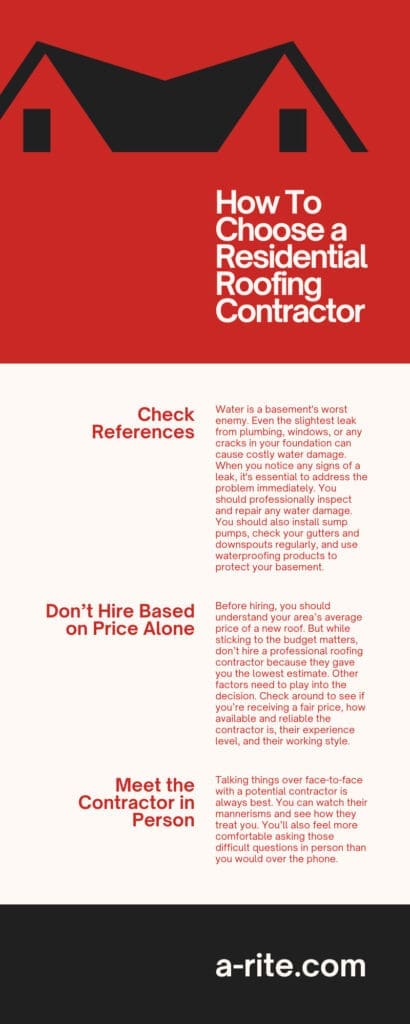What a nightmare it is to hire the wrong contractor for the job. You could end up with a project that takes significantly longer than expected. Or worse, you could have a team that leaves halfway through a project, leaving you to pick up the pieces. No homeowner wants to deal with that situation.
This blog focuses on choosing the right residential roofing contractor. You want to find a reputable and trustworthy company to provide a solid roof for your home, and this guide will help you decide which contractor is best.
Check References
Recommendations from friends and family come in handy when hiring any professional for any job, even a roofing contractor. Even though you trust these family members and friends, covering your bases is still important. Ask the contractor for a minimum of three references from previous clients. The references will provide insight into the professional’s craft and process.
Ask these past customers if the contractor stayed on their budgets, if they caused any delays, and how satisfied they were with the work. Online reviews also provide an in-depth look at the contractor, so look to see what the general consensus is for them.
Don’t Hire Based on Price Alone
Before hiring, you should understand your area’s average price of a new roof. But while sticking to the budget matters, don’t hire a professional roofing contractor because they gave you the lowest estimate. Other factors need to play into the decision. Check around to see if you’re receiving a fair price, how available and reliable the contractor is, their experience level, and their working style.
A lowball offer could result in a shotty job or an unreliable contractor. You could find yourself with an unfinished roof and a disappeared contractor. These are real scenarios that you need to be aware of.
Meet the Contractor in Person
Talking things over face-to-face with a potential contractor is always best. You can watch their mannerisms and see how they treat you. You’ll also feel more comfortable asking those difficult questions in person than you would over the phone.
If you hire that contractor, you’ll have the confidence to ask for updates and the project’s status since it’s easier to talk to someone you’ve already met.
Discuss Unplanned Repairs
Every home improvement project you handle will come with unplanned repairs, and the roof is no exception. For example, you may have rotting or moisture damage in the decking. The crew could discover this, which will cause delays in the roofing process.
Discuss with the potential contractor how they’ll handle these surprises and emergencies. Do they have strategies to get back on pace? Now you’ll have a better idea of their process when something comes up.
Look at Insurance and Licensing
A professional roofing company will have the correct licenses and insurance for the job, not to mention the proper tools, safety equipment, and materials. Contractors need to obtain the correct licenses and permits for every job. If not, they could face fines.
The insurance is to cover workers and any accidents on the job. Employees need coverage in case of falls or injuries, so never work with a contractor that can’t provide proof of insurance or licenses for each job.
Understand the Difference Between Roofing Companies and Individual Contractors
Homeowners have two types of contractors to choose from: roofing companies and individual contractors. Understanding the specifics of each one can help you decide which will work best for you.
A roofing company is large and can easily tackle significantly sized jobs, such as roof replacement. Since they’ll have many hands working on the same project, you’ll see decent turnaround times. It all depends on the size of your roof. You should also receive a decent warranty. Warranties are great because they can save you money if something goes wrong.
If you’re in Wisconsin, A-Rite is a reputable roofing and siding contractor in Wausau. We’ve been serving the community since 2002, and we’re passionate about ensuring that our customers have a wonderful experience working with us.
Are you looking for someone to repair or patch up your roof? An independent contractor will be the best-suited person for the smaller project. You’ll only have to deal with a single person as your point of contact, which can make things easier for you. When choosing an independent contractor, you may not have a warranty, and the project may take longer to complete.
Communicate Full Details
Be upfront and honest about your budget with the contractor. Before you make any phone calls, decide how much you can spend and receive financing if needed. You want to plan out what you need so that you can provide full details. When you reach out to the contractor, tell them about
- Past repairs
- Roof damage
- Specific roofing issues
- Last time you had your roof replaced
This planning and communication will avoid complications and help your contractor keep everything within budget. If you’re unsure of what the problem is, provide your contractor with as many details as possible.
Get Everything in Writing
Every job requires a written quote, no matter how big or small. This quote provides financial transparency and will help you dodge hidden costs.
You should create an estimated timeline that you can reference throughout the roofing project. This will keep everyone on the same page. Understand that the price may rise a bit due to unexpected issues, but your quote will offer a ballpark of what to expect.
Ask the contractor to include the following in the quote:
- Certificate of Insurance (at any time prior to start of work)
- Available Financing
Discuss a Timeline
Having a timeline will make a big difference, as it allows both parties to understand expectations. However, understand that delays will pop up.
Discuss prep work required before the project begins, estimated completion dates, and milestones. When will they order the materials? When can you expect the work to start? These are important facts to know.
This guideline for choosing a residential roofing contractor will help you feel confident and make the right decision. You don’t want to work with the wrong company because it could end badly. Use this guide as a reference through the hiring process.
 >
>




